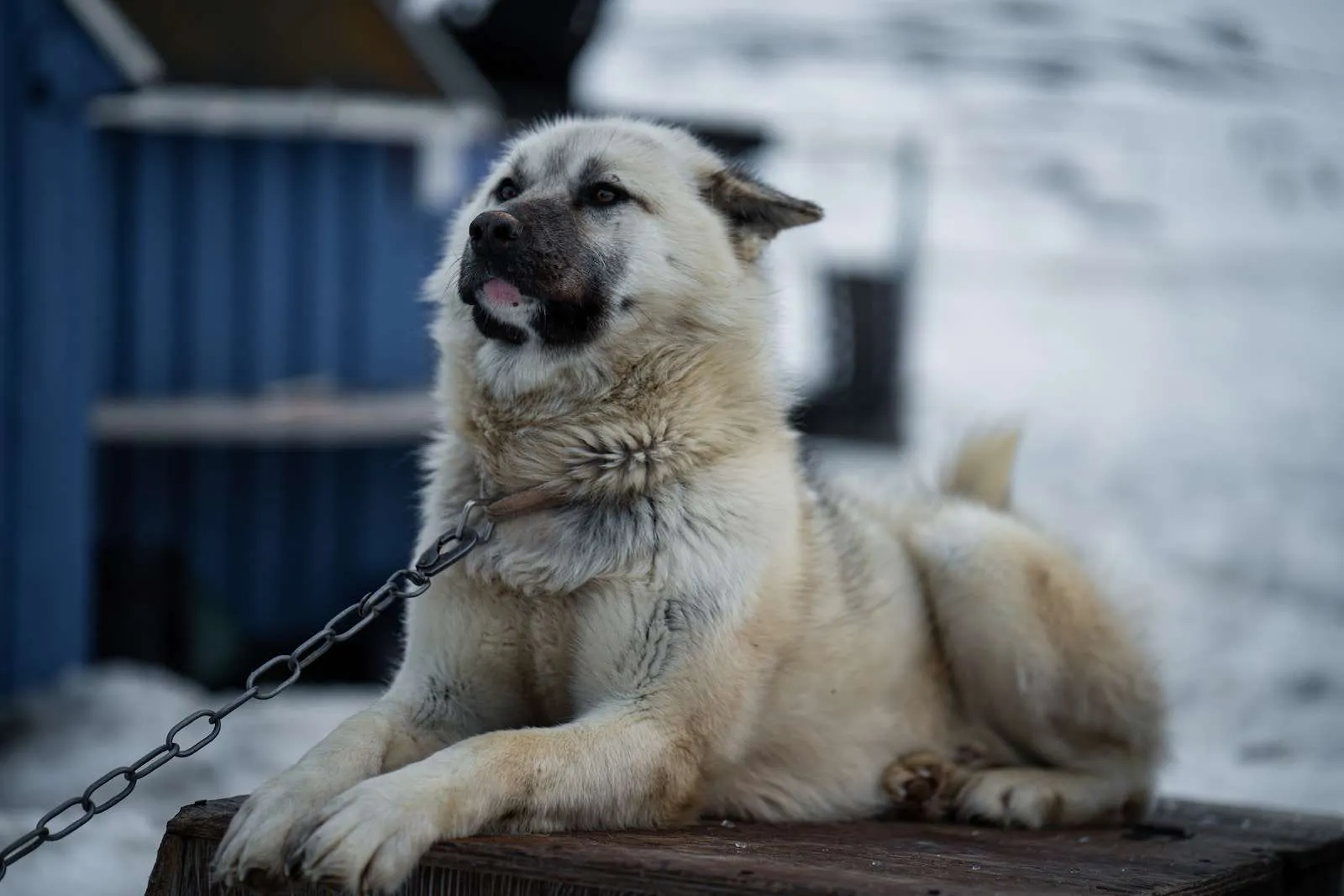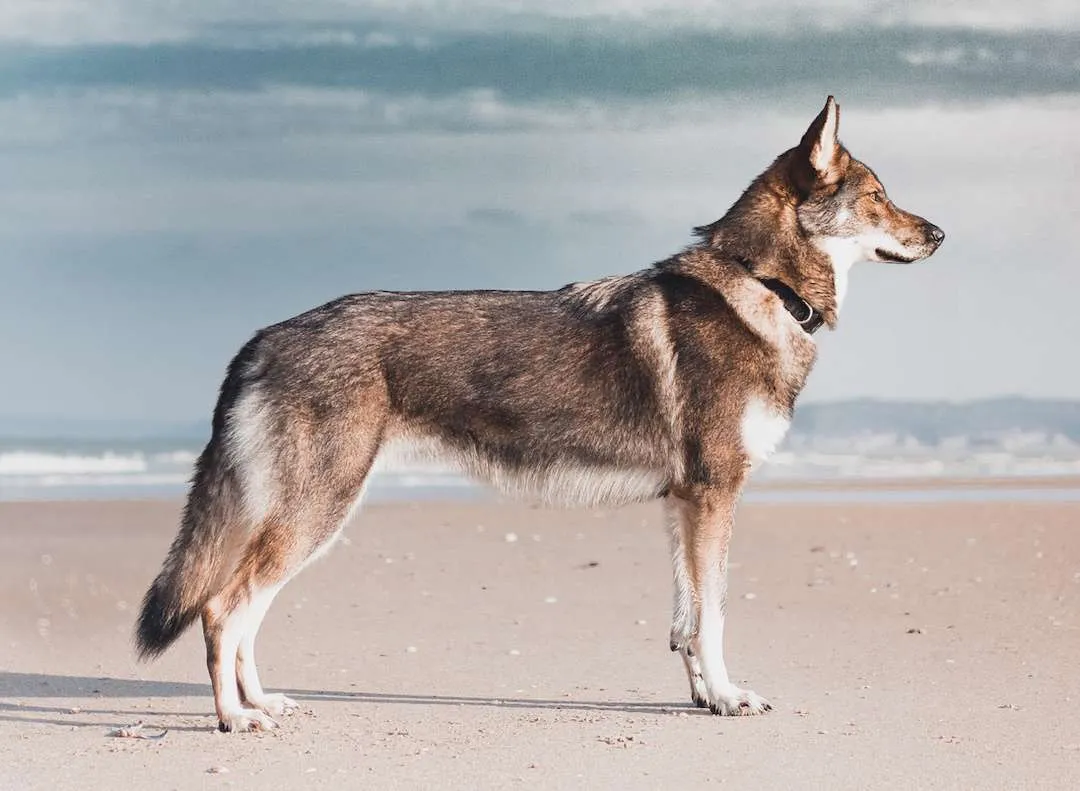Statistics:
- Height: 25-27 inches
- Weight: 80-100 pounds
- Life Span: 10-12 years
- Diet: Omnivorous, balanced diet suitable for large breeds
Komondor Overview:
The Komondor, often referred to as the “mop dog,” is a unique and easily recognizable breed, thanks to its distinctive corded coat. Originally bred in Hungary, this large and robust breed served as a livestock guardian, offering protection against predators.
Known for their strength and courage, Komondors are also very loyal and gentle with their human family members. Despite their formidable appearance, they are loving and dedicated pets, with a natural instinct to protect and guard those they care about.
Komondor Highlights:
The Komondor’s standout feature is its long, white, and corded coat, giving it a mop-like appearance. This coat is not just for show; it provides protection against weather and would-be attackers and helps the dog blend in with the flock it’s guarding.
The breed is also known for its serious and dignified demeanor. While they are affectionate and gentle with their families, they can be aloof and suspicious of strangers, a trait that makes them effective guardians even today.
Komondor Evolution and History:
The Komondor’s history dates back over a thousand years, with roots in the Magyar tribes that settled in Hungary. Their primary role was to guard livestock, particularly at night, a role they excelled in due to their strength, courage, and protective nature.
The breed’s distinctive coat evolved as a functional feature, offering protection and camouflage. Over time, the Komondor became a symbol of Hungarian cultural heritage, and its breeding and standards have been carefully preserved.
Komondor Size and Weight:
Komondors are a large and robust breed, standing between 25 to 27 inches tall and weighing between 80 to 100 pounds. Their size and physique are reflective of their working heritage, offering the strength and stamina needed for guarding and protecting livestock.
Their large size is complemented by a well-proportioned body, strong muscles, and a commanding presence. This physicality is a crucial aspect of their ability to perform their traditional role as guardians.
Komondor Personality:
The Komondor’s personality is a blend of loyalty, dignity, and a strong protective instinct. They are known for their unwavering devotion to their human families, often forming deep bonds with those they care about.
Despite their serious demeanor, they can be quite gentle and affectionate with their loved ones. Their natural guarding instincts make them vigilant and sometimes aloof with strangers, but proper socialization can make them well-mannered and controlled pets.
The Adaptability of the Komondor:
Komondors are adaptable dogs, but their large size and guarding instincts require consideration. They are best suited for homes with enough space for them to move around, and their protective nature makes them excellent watchdogs.
While they can adapt to various living situations, they need proper training, socialization, and an understanding of their unique characteristics. Their adaptability is rooted in their working heritage, requiring a commitment to meeting their specific needs and respecting their natural instincts.
Komondor Temperament:
The temperament of the Komondor is characterized by a serious and dignified nature. They are loyal and affectionate with their families, but their guarding instincts can make them reserved and even suspicious of strangers.
Their temperament requires understanding and respect for their natural instincts. With proper training and socialization, their temperament can be shaped into a well-mannered and loving family companion, reflecting their dual nature as protectors and gentle giants.
Komondor Maintenance and Grooming:
The Komondor’s unique corded coat requires specialized grooming and maintenance. Regular care is needed to keep the cords clean, and matting must be prevented. The grooming process can be labor-intensive and requires knowledge and patience.
Other routine care, such as teeth, nails, and ears, must also be attended to. The maintenance and grooming of the Komondor reflect their unique appearance and functional needs, requiring a commitment to their specific care requirements.
The Trainability of the Komondor:
Komondors are intelligent and capable dogs, but their independent nature can make training a challenge. They respond best to positive reinforcement techniques and consistent, firm guidance.
Early socialization is crucial for them to become well-adjusted pets. Training a Komondor requires understanding and respect for their unique characteristics, with a focus on channeling their natural instincts in a positive direction.
Exercise Needs of the Komondor:
The Komondor requires regular exercise to maintain their physical and mental well-being. While they are not as hyperactive as some breeds, they need daily walks and playtime to stay healthy and happy.
They thrive on activities that engage their minds and bodies, reflecting their working heritage. Adequate exercise is crucial for their overall well-being, considering their size and energy levels.
Komondor Health:
The Komondor is generally a healthy breed, but they can be prone to certain health issues:
- Hip Dysplasia: Common in many large breeds, this can be managed through regular check-ups and maintaining a healthy weight.
- Bloat: This serious condition requires immediate medical attention, and understanding the signs and prevention is vital for Komondor owners.
- Eye Issues: Regular eye check-ups can help in early detection and treatment of potential problems like cataracts.
Komondor Care:
Caring for a Komondor requires a commitment to understanding their unique needs. Regular exercise, grooming, and mental stimulation are essential to their well-being.
Their care also includes proper training and socialization, respecting their natural instincts as guardians. Proper care reflects their specific needs and ensures a happy and well-adjusted pet.
Komondor Feeding:
Feeding a Komondor requires a balanced diet suitable for a large breed. High-quality commercial foods or a carefully balanced homemade diet can meet their nutritional needs.
Portion control and consideration of their age, weight, and activity level are essential. Regular consultations with a veterinarian can ensure their dietary requirements are being met.
Komondor Coat Color and Grooming:
The Komondor’s coat is its most distinctive feature. It is white and naturally forms cords as the dog matures. This corded appearance requires regular grooming to prevent matting and keep the coat clean.
The grooming process can be time-consuming and requires specialized knowledge. Regular care of their unique coat reflects their working heritage and contributes to their overall health and appearance.
Komondor and Children:
Komondors are generally good with children, especially when raised with them. Their gentle and protective nature can make them excellent family companions.
However, their size and guarding instincts require supervision and understanding. Proper socialization and training can ensure positive interactions with children and foster a loving and protective relationship.
Komondor and Other Pets:
Komondors can get along well with other pets, especially if raised together. Their guarding instincts may lead them to be protective of other animals in the household.
Understanding and managing their natural behavior is essential when integrating them with other pets. Proper socialization and respect for their instincts can foster harmonious relationships with other animals.
Similar Dogs:
- Puli: The Puli and Komondor share Hungarian origins, similar corded coats, and were both used as livestock guardians. Their similarities reflect their shared heritage and functional roles.
- Bergamasco Shepherd: With its matted and corded coat, the Bergamasco shares visual and functional similarities with the Komondor. Both breeds were used for guarding and herding, creating a shared working heritage.
In conclusion, the Komondor is a breed that embodies strength, dignity, and a strong protective instinct. Their unique appearance, coupled with their loyal and gentle nature, makes them standout family pets for those who appreciate and understand their unique attributes. The Komondor’s rich history and distinctive characteristics offer a rewarding and fulfilling companion for the right owner.

